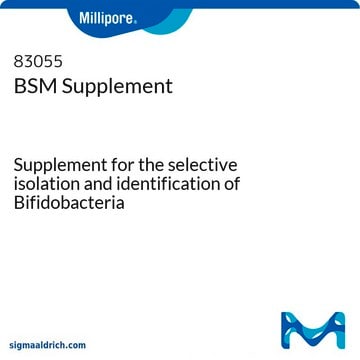90577
Bifido Selective Supplement B
suitable for microbiology
Synonym(s):
Acetic acid solution, Acetic acid Supplement
About This Item
Recommended Products
sterility
sterile
Quality Level
form
liquid
shelf life
limited shelf life, expiry date on the label
application(s)
environmental
food and beverages
microbiology
suitability
Bifidobacterium spp.
SMILES string
CC(O)=O
InChI
1S/C2H4O2/c1-2(3)4/h1H3,(H,3,4)
InChI key
QTBSBXVTEAMEQO-UHFFFAOYSA-N
Looking for similar products? Visit Product Comparison Guide
Related Categories
Application
Compatibility
Glacial acetic acid (1%) 5 ml
Storage Class Code
12 - Non Combustible Liquids
WGK
nwg
Flash Point(F)
Not applicable
Flash Point(C)
Not applicable
Choose from one of the most recent versions:
Already Own This Product?
Find documentation for the products that you have recently purchased in the Document Library.
Customers Also Viewed
Related Content
Ketosulfoxonium ylides serve as versatile carbene equivalents for large-scale reactions, releasing dimethyl sulfoxide biproducts.
Our team of scientists has experience in all areas of research including Life Science, Material Science, Chemical Synthesis, Chromatography, Analytical and many others.
Contact Technical Service











